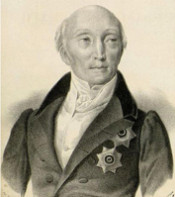
Birthday anniversary of M. M. Speransky, count, public figure, statesman and reformer
1 (12) January, 1772 in the village Cherkutino, Vladimir province (Sobinsky district, Vladimir region) in a priest's family was born Mikhail Mikhailovich Speransky, count (1839), public figure, statesman, an honorary member of the Imperial Academy of Sciences (1819) and a member of the Imperial Russian Academy (1831), the closest adviser to Emperor Alexander I, the author of the plan of liberal reforms, the initiator of creation of the State Council (1810) and the head of the codification of the basic state laws of the Russian Empire (1832).
Mikhail Mikhailovich graduated from Vladimir's Seminary, entering which he was given the name of Speransky (from Lat. «sperare» - to hope). Being the best student, Speransky was transferred to the seminary at the Alexander Nevsky Lavra in St. Petersburg and in 1792, having graduated from it, he stayed at the seminary as a professor of mathematics, physics, and eloquence. In 1795 he was appointed prefect (chief) of the seminary. In 1797 Speransky retired from the seminary and joined the Office of the Procurator-General.
In 1801, Speransky received the rank of the actual privy councilor and started compiling various government decrees and manifestos. In 1803-1807 Mikhail Speransky served in the Ministry of Internal Affairs. During these years he wrote the works which placed him among the first political thinkers of the time: "Reflections on the state system of the empire", "Note on the structure of judiciary and government institutions in Russia", "About the spirit of the government." In 1807 he became state secretary of the emperor, and in 1808 accompanied Alexander I to Erfurt for a meeting with Napoleon Bonaparte, who called Speransky "the only bright intellect in Russia."
In 1809 at the request of Alexander I Speransky made up a plan of government reforms - "Introduction to the code of state laws." It was a project of reforms that were to be carried out from above and keep at the same time autocratic power of the tsar. Speransky developed a coherent system of central and local government, based on the principle of separation of powers - legislative, executive and judicial. He introduced the election of administrative and executive authorities, however the right to participate in governance was given only to persons with certain property qualification. The supreme administrative body was the State Duma, locally - provincial, county and township councils.
Executive bodies were formed by the same principle. There was also established another supreme body intended to unite the activities of the legislative, executive and judicial powers – the State Council, an advisory institution under the emperor. Its members were not elected but appointed by the Emperor himself. Alexander I recognized the project Speransky being "satisfactory and useful", but some senators, ministers and other senior dignitaries considered it too radical and “dangerous". Alexander I met their requirements, and the project was rejected. Only a few parts of the Speransky plan were implemented: 1 (13) January 1810 the State Council was established, and in 1811 the reorganization of ministries was completed.
In 1812, as a result of intrigues and denunciations Speransky was accused of treason and exiled to Nizhny Novgorod under strict police surveillance, and then transferred to Perm. After a series of letters to Alexander I in 1816 Speransky was appointed civil governor of Penza, and three years later became governor-general of Siberia. A talented administrator, he had succeeded to improve management of this part of the country, and in 1821 was returned to St. Petersburg.
After accession to the throne of Emperor Nicholas I, Speransky was a member of the Supreme Criminal trial over Decembrists, and then led a large-scale work on the codification of laws. Under his leadership, were drawn Complete Collection of Laws of the Russian Empire in 45 volumes (1830) and the Code of the Russian Empire in 15 volumes (1832). As a reward for this work he received the Order of Saint Andrew the First-Called.
Speransky was also a member of several supreme government committees; in 1835-37 - he taught legal science the heir to the throne, the future Emperor Alexander II, and from 1838 was chairman of the Department of the laws of the State Council.
1 (12) January 1839, the day of his 67th anniversary, Mikhail Mikhailovich Speransky was granted the title of count, but just 41 days later, 11 (23) February, count-reformer died from cold. M. M. Speransky was buried at the Tikhvin cemetery of the Alexander Nevsky Lavra.
Lit.: Записка М. М. Сперанского о вероятностях войны с Францией после Тильзитского мира // Русская старина. 1900. Т. 101. № 1. С. 58-65; То же [Электронный ресурс]. URL: http://www.museum.ru/museum/1812/Library/Rs9/rs9.txt; Минаева Н. В. М. М. Сперанский в воспоминаниях современников: конец XVII — первая половина XIX веков. М., 2009; Нольде А. Э. М. М. Сперанский. М., 2004; Пыпин А. Н. Общественное движение в России при Александре I. СПб, 1871; Сперанский М. М. Правила высшего красноречия. СПб., 1844; Томсинов В. А. Сперанский. М., 2006; Троицкий Н. А. Под скипетром Александра I: Проекты М. М. Сперанского // Россия в XIX веке: Курс лекций. М., 1997.
Based on the Presidential Library’s materials:
Mikhail Speransky (1772–1839): [digital collection].
The material was prepared jointly with the M. Yu. Lermontov Penza Regional Library

